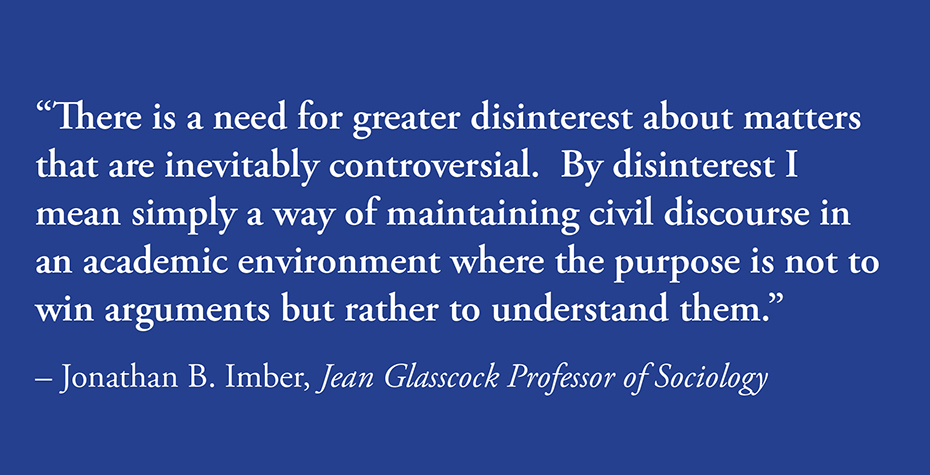Sociology Professor Jonathan Imber on the importance of respect for conservative ideals in the academic community

Jonathan Imber, Jean Glasscock Professor of Sociology, gave a keynote address at Kennesaw State University (Georgia) last month, “On Teaching Conservatism.” Imber spoke about a Wellesley course he has offered for a decade and the importance of respect for conservative ideals in the academic community.
“There is a need for greater disinterest about matters that are inevitably controversial,” Imber said in an email. “By disinterest I mean simply a way of maintaining civil discourse in an academic environment where the purpose is not to win arguments but rather to understand them. There is always a space for debate, but its rules have always demanded civility and a willingness to listen.”
“If you ask me whether I am “a conservative” or whether I am “conservative,” I will insist on at least an hour to explain myself,” Imber said in his speech. “I ask students whether or not it matters that I profess a conviction about being conservative or being a conservative in order to teach or understand conservatism. By professing to be conservative, does it mean that you automatically assume to know my opinions on everything from abortion to welfare policy, if I even have such opinions?”
His keynote address at Kennesaw State, titled “On Teaching Conservatism,” was covered by the Marietta Daily Journal. “Identity politics” are an oversimplification, he told the crowd. “It is biased to assume to know a person’s political views because of one label. Just because someone might identify as a conservative,” he said. When asked by an anonymous student at the forum what a “closeted conservative should do on a liberal campus,” the Journal reported, Imber said, “Come out.”
“On the first day of class in my conservatism course I explain that I am a registered Republican (which remains an astonishing confession to more than a few of my colleagues at my college),” Imber said in his speech. “I emphasize that my political opinions have been deeply informed by what I read. I tell the students that they have arrived in my classroom not to be turned into conservatives but to understand the relationship between their already developing convictions and what they have read and will read. If those convictions are “conservative” or “liberal” my aim is to strengthen both.”
At Wellesley, Imber said he advises students to ask questions about their own and others' arguments and ideas. “The best thing that we teachers can do for our students is to teach, not preach,” Imber said. “Students can always tell when they are being persuaded rather than taught.”
Imber told the KSU crowd, “whether or not I believe conservatism is superior to liberalism or liberalism to conservatism, it is important to remember in my classroom that disagreement is a good thing, especially when it is founded on principles and facts, neither of which points us always in the same direction in any sure way.”
“I hope that my students know that I have only touched the surface of whatever we have addressed in my courses,” Imber said. “I wish them the curiosity to dig deeper and to find ways to help others do the same.”
